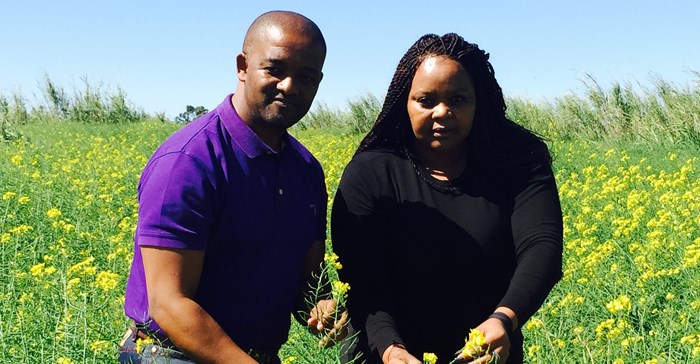The Eastern Cape Development Corporation (ECDC) is throwing its weight behind the development of a 500 hectare (ha) commercial canola oil production drive in Alexandria and has already injected some R1,1 million of risk capital into a 50ha trial on an 80/20 funding basis with project owners Anathi Oils.

Canola Oil plantation in Alexandria
Preliminary yield estimates by the Western Cape-based Elesenburg Canola Research Unit indicate potential yields of two to three tons of canola per hectare. This is higher than the national average of 1,6 tons per hectare.
Initiated in 2014, Anathi Oils has already concluded an off-take agreement with WUS Lloyds of London who will become the global distributors of the unprocessed oil. "We are already delighted with the yield estimates of two to three tons per hectare because they confirm the results of the ECDC-funded feasibility study and business plan which indicated that the Eastern Cape is a better location for canola production than the Western Cape which currently accounts for 99,69% of national production.
Moving the project into the commercialisation stage
"After the harvest in October the project should move into commercialisation stage in the following winter on 500ha of land with the possibility of 600 seasonal jobs being created in the process. ECDC has also taken on a first right of refusal to fund the R7 million processing factory which will be established to process the primary product into canola oil and butter among other products. This is an exciting development because ECDC also attracts the financial muscle of third-party funders," says Anathi Oils chief executive Weza Moss.
Moss says the 500ha commercial plantation will be cultivated working with communal farmers. Anathi Oils is also engaging the Department of Rural Development and Agrarian Reform (DRDAR) to inject R5 million toward primary production. These funds are earmarked to procure farming inputs, training and development of farmers, soil preparation as well as technical support.
Benefits of canola crops
ECDC risk capital project manager Wendy Hempe says canola is an organic health crop which falls below olive oil, but it is more affordable. It has various health benefits which help alleviate heart disease, diabetes and stroke. Not only is it edible, it is also used by the pharmaceutical industry in their products because it contains omega oil. At harvest next month, oilseed will be harvested and crushed for oil. The by-product will be used for animal feed because it is protein-rich.
"There are obvious benefits for the processing of the crop because of the oil shortage in South Africa. ECDC is confident that the project holds much potential for sustainability particularly in an age where the general population has become more health conscious with people actively seeking healthier alternatives.
"The project falls within ECDCs risk capital philosophy of supporting projects with a high economic impact with a sustainability and job creation element. Currently, the project employs 32 seasonal workers and this should grow to 600 at commercialisation," explains Hempe.
Moss says weather conditions in the Eastern Cape are more conducive for the growth of the crop than the Western Cape. "The rainfall in the Eastern Cape is good, and the swell is much better than the Western Cape. This further reiterates the findings of the feasibility study and business plan. This should hopefully become the beginning of a vibrant canola oil industry in the Eastern Cape," Moss adds.








































